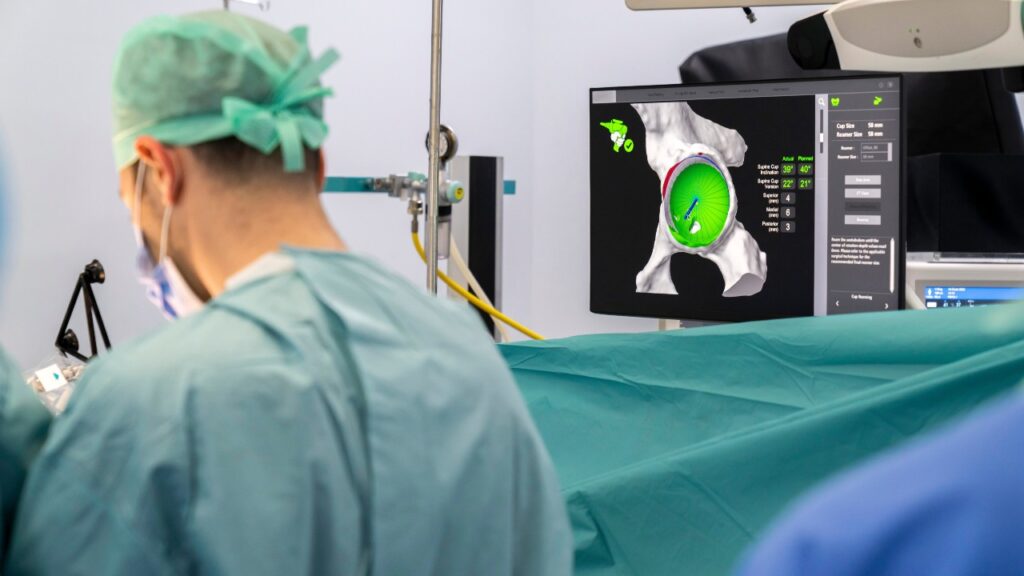3M Bair Hugger injuries: Who’s affected?

Did you or a loved one suffer a deep joint infection after surgery using a Bair Hugger warming blanket?
The 3M Bair Hugger forced-air warmer blanket is often used in hospitals to regulate the body temperature of patients undergoing hip replacement or knee replacement surgery.
However, these forced-air warmers may put joint replacement patients at risk of dangerous complications, such as deep joint infections.
These Bair Hugger complications may require significant treatment, including:
- Hospitalization
- Additional surgeries
- Joint implant removal and revision
- Physical therapy
- Placement of an antibiotic spacer in the infected joint
- Intravenous antibiotic treatment
- Amputation
Do you qualify?
If you or someone you know suffered a dangerous forced-air warmer complication such as deep joint infection, you may have a legal claim.
Fill out the form on this page for more information.
3M Bair Hugger forced-air warmer
Keeping patients warm during surgery has been shown to reduce bleeding and improve recovery time. The Bair Hugger is a disposable blanket that is connected to a portable heater that blows hot air on the patient’s skin, helping patients under anesthesia regulate their body temperature. When the Bair Hugger was introduced to the market in 1988, it had a profound impact on surgical practices.
However, the Bair Hugger may pose the risk of dangerous complications for patients who receive hip replacements, knee replacements or other joint implants. It is alleged in a growing number of lawsuits that forced air may spread bacteria into the surgical site, putting patients at risk for deep joint infections.
Studies of forced-air warmers, including the Bair Hugger, have not conclusively determined that they cause surgical site infections (“SSIs”), but the studies raise concerns about their potential risks.
A 2011 study, “Forced-air warming blowers: An evaluation of filtration adequacy and airborne contamination emissions in the operating room,” published in the American Journal of Infection Control, found 58% of the forced-air warmers studied (including the Bair Hugger) produced and emitted airborne contaminants. Although the study did not determine whether the contaminants were viable, it observed that high levels of contamination are not necessary to cause an infection when dealing with a hip or knee replacement.
Moreover, several studies show that the Bair Hugger’s forced air significantly disrupts the ultra-clean airflow used in operating rooms. These studies also show that the Bair Hugger is likely to cause temperature differences that cause convection currents. Those convection currents, in turn, could draw air from non-sterile areas, such as the floor, into the surgical site.
At least one study described air from the non-sterile areas as laden with pathogens, thereby compromising the surgical site’s sterility. A 2011 study, “Forced-air warming and ultra clean ventilation do not mix,” published in Journal of Bone & Joint Surgery, proposed that the forced-air warmer’s disruption of the ultra-clean air, along with its creation of convection currents drawing air from non-sterile areas, are plausible explanations for what it found to be a significant association between using forced-air warmers and risk of SSIs.
Finally, a 2012 study, “Do forced air patient-warming devices disrupt unidirectional downward airflow?” (Journal of Bone & Joint Surgery) and two 2013 studies — “Forced-air patient warming blankets disrupt unidirectional flow” (Bone & Joint Journal) and “Patient Warming Excess Heat: The Effects on Orthopedic Operating Room Ventilation Performance” (Anesthesia & Analgesia) — found forced-air warming significantly increased the number of airborne particles over the surgical site. The studies did not conclude the additional particles carried bacteria, but they found the increased particles were a cause for concern.
Bair Hugger lawsuits
3M has been hit with Bair Hugger lawsuits alleging the forced-air heating blanket caused surgery patients to contract infections from germs picked up in the operating room and circulated by the device.
Plaintiffs allege 3M was aware of the risk of dangerous complications associated with the Bair Hugger since at least 2009, but continued to market the device as safe. The lawsuits claim that patients suffered severe joint infections due to the use of the Bair Hugger during surgery. To treat the infection, these plaintiffs allegedly had to undergo multiple surgeries and have the joint implant removed. One plaintiff said he had to have his leg amputated after using the Bair Hugger.
If you or a loved one experienced Bair Hugger complications such as deep joint infection after the forced-air heating blanket was used during surgery, you may be able to take legal action against the device manufacturer. A Bair Hugger lawsuit may help you obtain compensation for your medical bills, lost wages, pain and suffering, and more.
Fill out the form on this page now for a FREE case evaluation.
GET HELP – IT’S FREE
Join a Bair Hugger Lawsuit Investigation
If you qualify, an attorney will contact you to discuss the details of your potential case at no charge to you.
ATTORNEY ADVERTISING
The choice of a lawyer is an important decision and should not be based solely on advertisements.
Counsel responsible for this advertisement includes:
LegaFi Law LLC
www.legafi.com, 888-4-LegaFi
McDonald Worley, P.C.
www. mcdonaldworley.com, 877-721-3423
PAID ATTORNEY ADVERTISEMENT: THIS WEB PAGE IS AN ADVERTISEMENT AND THE PARTICIPATING ATTORNEY(S) ARE INCLUDED BECAUSE THEY PAY AN ADVERTISING FEE. Top Class Actions is not a law firm, lawyer referral service, or prepaid legal services plan. We do not endorse or recommend any third-party claims processing company, lawyer, or law firm who participates in the network. We do not make any representation, and have not made any judgment, as to the qualifications, expertise, or credentials of any participating lawyer or processing group. No representation is made that the quality of the legal services or claims processing to be performed is greater than the quality of legal services or claims processing performed by other lawyers or claims processing group. The information contained herein is not legal advice. Any information you submit to Top Class Actions does not create an attorney-client relationship and may not be protected by attorney-client privilege. Instead, your information will be forwarded to an attorney or claims processing firm for the purpose of a confidential review and potential representation. All photos contained on this website are of models and do not depict clients.












